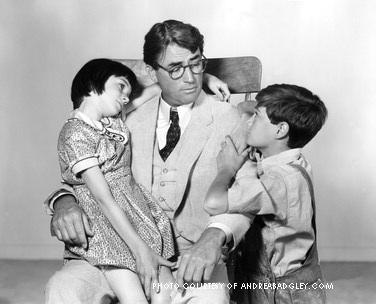
Lesson #3: Legacy is not loud repetition of record-breaking sport statistics or physical wealth, it’s the memory of lessons that couldn’t have been taught at any other time, in any other way, by anyone else.
To Kill a Mockingbird is written from the view of Scout, Atticus Finch’s daughter. Especially seen through her eyes, it is easy to see that Atticus serves as a major role model for both her and her brother, Jem.
As stated in Part One and Part Two , Atticus himself has a set, strong moral character. This becomes evident when he directly states his view on empathy to his daughter: “You never really understand a person until you consider things from his point of view…Until you climb into his skin and walk around in it” (Chapter 3). Showing his mature philosophy on comprehending mankind, Atticus communicates a sense of thinking on levels that go beyond one’s own self. This is a lesson perfect for children to learn around 5-10, the general age range of Scout and Jem in the first half of the book. Compassion is most often successfully taught by those who are admired by the impressionable child (i.e. father or coach).
Throughout the novel, it is clear that Atticus has been around the block a few times. Wisdom is the gift he has to offer to his kids, and he so willingly gives it. He felt how important it was to leave a legacy of empathy and understanding for posterity.
Atticus also understood the importance of validating children in order to teach them, as stated in Chapter 9 when he says, “When a child asks you something, answer him, for goodness sake. But don’t make a production of it. Children are children, but they can spot an evasion faster than adults, and evasion simply muddles ’em.” Atticus’ life experience and morally correct personality allow him to know what he wants to teach his kids and how he wants to teach it, ultimately leading to influencing both his own children and those reading To Kill a Mockingbird.
A modern day example of a philosophy-based legacy is that of the late Dean Smith. It was obvious with the thousands of articles, quotes and anecdotes that Coach Smith meant a lot of things to a lot of different people. He, too, demonstrated an impeccable understanding of the people and society around him. For example, he, as a successful sports coach, could say this about teachers: “Our teachers at the public school level are the most underpaid for the importance of their job in America.” Many professionals in powerful positions seem to not look down the economic ladder long enough to see the struggles of those below them; but Dean Smith did, just as Atticus looked down the social/racial ladder of Maycomb. This attitude was affecting due to his access to college age students and media that could present his thoughts further.
Based on the legacies of these two great men, it is obvious we remember what is taught when the influential stars align. Our culture celebrates those who understand society as a whole and as individuals. To leave our own legacies we must take on said understanding and project our thoughts honestly and sincerely, and just maybe those who are listening will remember.